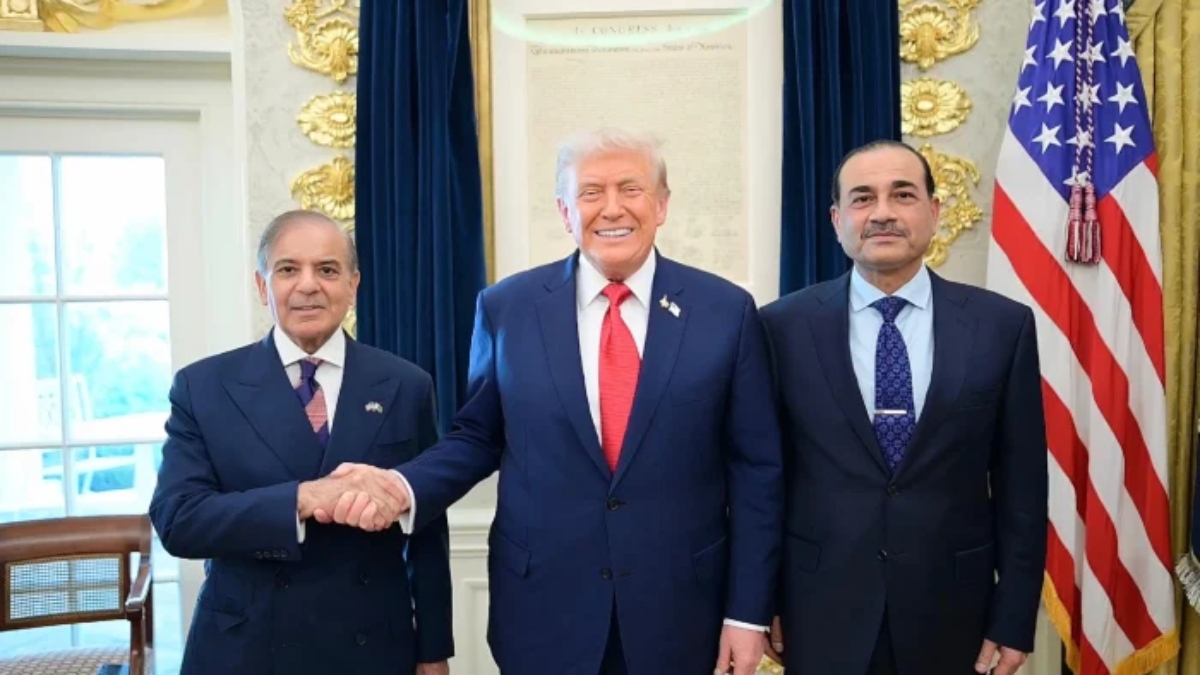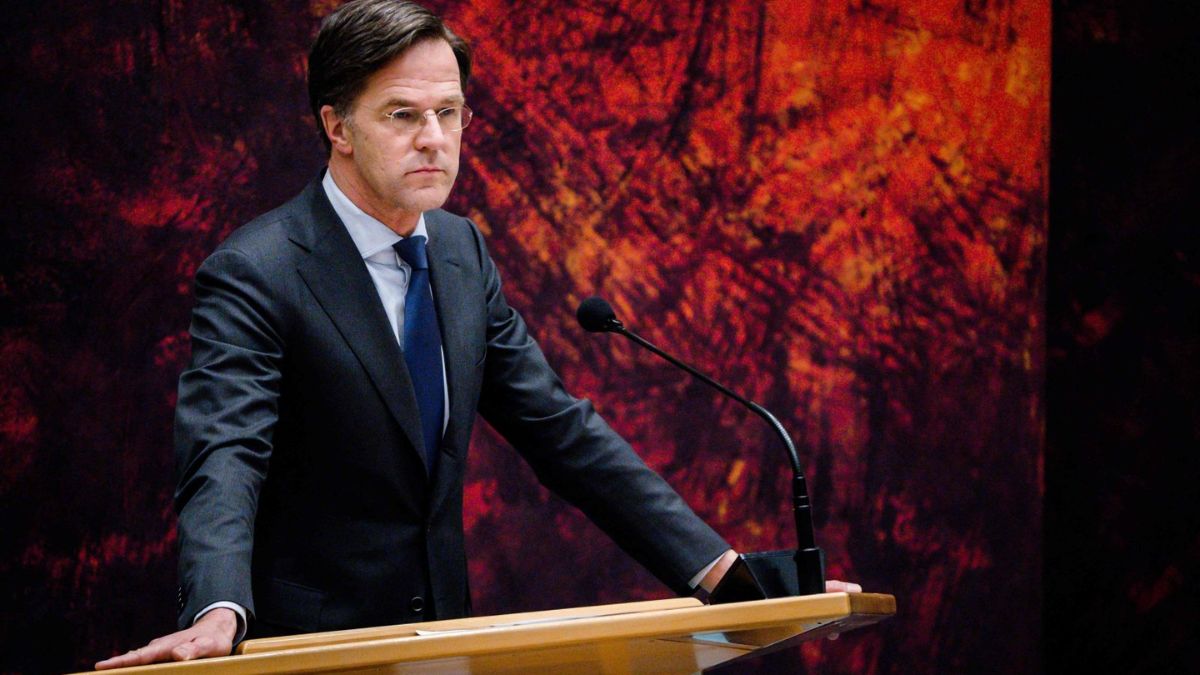In a striking shift from his earlier denunciations of Pakistan as a “terrorist haven,” US President Donald Trump hosted Prime Minister Shehbaz Sharif and Army chief Asim Munir in the Oval Office on Thursday. The meeting, which lasted around 80 minutes, was cloaked in secrecy, with neither side releasing details or issuing statements.
What the public saw instead were photos circulated by the Pakistani government: Sharif and Munir seated regally beside Trump, later posing with him as he flashed his familiar thumbs-up.
The optics marked a sharp reversal for Trump, who had once derided Pakistan as duplicitous and accused it of sheltering Osama bin Laden. Now, by publicly embracing the country’s civilian and military leadership, Trump signalled a transactional rekindling of ties.
A meeting full of symbols, but short on clarity
Among the images, one stood out. Trump proudly displaying a model of the White House, with Secretary of State Marco Rubio seen laughing alongside the Pakistani leaders. Another detail drew speculation—Trump wore a pin shaped like a fighter jet.
While some Pakistani supporters rushed to interpret it as a nod to Islamabad’s ‘downing’ of Indian jets, reports clarified that he had donned it earlier for his meeting with Turkish President Recep Tayyip Erdogan, in connection with American fighter aircraft sales.
It would also be prudent to add here that India has completely dismissed Pakistan’s claim of shooting down Indian fighter jets during Operation Sindoor this year as unadulterated rubbish emanating out of Islamabad.
Nevertheless, the engagement was loaded with symbolism but lacked in substance. Neither Washington nor Islamabad offered a readout.
Instead, speculation flourished: Was Trump eyeing Pakistan’s mineral reserves, revisiting his proposal to regain the Bagram air base in Afghanistan, or repurposing Pakistan in the shadow of shifting alliances in West Asia?
Shadow of Erdogan and Saudi Arabia
The timing raised more questions. Just hours earlier, Trump had lunched with Erdogan, urging Turkey to reduce reliance on Russian energy.
The US has also looked with caution at Pakistan’s budding defence ties with Saudi Arabia, which appear aimed at Israel, one of Washington’s closest allies. Still, the Trump administration’s muted reaction suggested a willingness to look the other way for broader strategic dividends.
Pakistan’s Defence Minister Khwaja Asif was excluded from the Oval Office meeting. He trie to make his presence felt on social media, repeating the claim of Islamabad gaining geostrategic prominence: “Victory over India, defence agreement with Saudi Arabia, and unprecedented progress in Pak-US relations. 2025, a year full of successes, Alhamdulillah. The continuation of the successes of the hybrid system’s partnership. Allahu Akbar.”
His words, laced with triumphalism, provided no clarity, only fuelling speculation at home about what deals—if any—were struck.
Trump’s trademark bluster
The US president’s comments before the meeting offered another window into his approach. Speaking to reporters, Trump lauded his own record—claiming he had “solved seven wars”—before announcing that “a great leader” and a “field marshal” were about to arrive. In typical fashion, he forgot their names, joking they might already be in the room.
For critics in Pakistan, this was proof that Trump’s praise was shallow and purely transactional.
“Trump made 30,573 false or misleading claims in his first term alone. His strategy is pure exaggeration. Here, he inflates the stature of a military dictator and his puppet with empty praise, all to conscript their services for his dirty work in Gaza,” said Adil Raja, a retired army officer turned outspoken critic of Pakistan’s military establishment, in a post on X.
He went further: “Calling Pakistan’s fascist rulers ‘great leaders’ is just the price tag for making them his cleanup crew. Only idiots can celebrate this statement!”
Opposition fury, establishment pride
Such remarks reflect the polarised reaction within Pakistan. Supporters of Imran Khan and the opposition Pakistan Tehreek-e-Insaf (PTI) see Trump’s Oval Office welcome as an endorsement of authoritarian rulers who suppress democracy.
For them, it is confirmation that Washington values compliance and military control over genuine popular representation.
By contrast, allies of the Sharif government and the military hailed the encounter as a breakthrough. After nearly two decades of strained ties—during which Pakistan faced accusations of harbouring terrorists and Trump himself cut aid citing duplicity—the spectacle of their leaders in the White House was celebrated as a return to international relevance.
From condemnation to cooperation
Trump’s pivot is especially notable given his past rhetoric.
In 2012, he publicly blasted Pakistan for hiding bin Laden, tweeting, “When will Pakistan apologise to us for providing safe sanctuary to Osama Bin Laden for 6 years?! Some ‘ally.’” And in 2018, as President, he declared an end to billions in aid, accusing Pakistan of “doing nothing for us.”
Yet this cycle of US embrace and rejection is not new.
But for many in Pakistan, the Oval Office scene revived older memories—particularly 1971, when US president Richard Nixon and his National Security Adviser Henry Kissinger threw their weight behind General Yahya Khan even as his army crushed dissent in East Pakistan.
Then, as now, Washington saw Pakistan’s military strongmen as convenient tools for its regional designs, dismissing democratic voices in the process. The result was catastrophic: mass atrocities, international isolation and ultimately the break-up of the country with Bangladesh’s creation.
Likewise, Trump’s embrace of Munir carries the same risk—outsiders propping up authoritarian generals for short-term gain while ordinary Pakistanis bear the long-term consequences.
Those consequences, they warn, are already visible in today’s transactional bargains.
Just as the Cold War turned Pakistan into a proxy battlefield, Trump’s new alignment seems to reduce the country to a resource hub and strategic pawn.
The Times of India reported that Pakistan now appears to be opening up its mineral wealth for exploitation and serving, according to some accounts, as a front for US-linked business interests.
A transactional future
For many Pakistanis, the Oval Office spectacle was less about bilateral friendship than about bargains. The US seeks footholds—whether in Afghanistan, in resource extraction, or in curbing Russian and Chinese influence. Pakistan’s military establishment, in turn, looks for legitimacy and leverage abroad to bolster its authority at home.
The absence of transparency only deepens suspicion. Without official briefings, Pakistanis are left to parse cryptic tweets, boastful claims and photographs for meaning.
To critics, it looks like another episode in the long history of Pakistan’s rulers trading sovereignty for survival, dressed up as diplomatic triumph.
A deal wrapped in exaggeration
The Trump-Sharif-Munir meeting reflects a familiar pattern of public theatre masking backroom bargains.
For Trump, it was another stage to boast and posture. For Pakistan’s rulers, it was a chance to claim validation.
But for many citizens, especially opponents of the current regime, it was an unsettling reminder of how international support can shore up domestic authoritarianism.
“Fascist rulers, false claims”—the phrase circulating online—captures both sides of the scepticism. That Trump’s hyperbole flatters dictators and that Pakistan’s military-political establishment eagerly accepts the role of doing “cleanup jobs” for powers abroad.
End of Article

)
)
